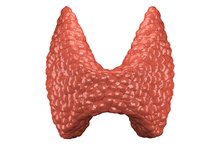What does fact checked mean?
At Healthfully, we strive to deliver objective content that is accurate and up-to-date. Our team periodically reviews articles in order to ensure content quality. The sources cited below consist of evidence from peer-reviewed journals, prominent medical organizations, academic associations, and government data.
- Linus Pauling at Oregon State University: Iodine
- PubMed Health: Panic Disorder
- PubMed Health: Panic Disorder
- Pubmed Health: Hyperthyroidism
- Pubmed Health: Hyperthyroidism
- Mayo Clinic: Thyroid Disease: How Does it Affect Your Mood?
The information contained on this site is for informational purposes only, and should not be used as a substitute for the advice of a professional health care provider. Please check with the appropriate physician regarding health questions and concerns. Although we strive to deliver accurate and up-to-date information, no guarantee to that effect is made.
Low Iodine Levels & Panic Attacks
Iodine is a mineral used by the human body to produce thyroid hormones and so plays a major role in oxygen consumption and normal body function. It is important in brain development and function as well. Low levels can lead to impaired brain development in infants and impaired function in adults. Deficiency causes a slowing or depression of the brain, while higher levels can lead to nervousness, irritability and anxiety. It is this higher level, not deficiency, which is associated with hyperthyroidism and panic attacks.
Panic Attacks
The diagnostic criteria requires medical conditions be ruled out, including hyperthyroidism, before identifying the attacks as panic disorder.
Hyperthyroidism
What Is Low TSH?
Learn More
One of the first documented associations between hyperthyroidism and panic attacks was noted in a case study published in 1983 in “Psychosomatics.” Hyperthyroidism is a condition in which too much thyroid hormone is produced. One potential cause of hyperthyroidism is too much iodine.
Iodine Deficiency
Iodine deficiency is often associated with hypothyroidism and goiters, the enlargement of the thyroid due to low thyroid hormone levels. Severe iodine deficiency in an infant can result in mental and growth retardation as well as death.
Iodine
Sodium & Thyroid Problems
Learn More
The recommended daily allowance for iodine set by the Institute of Medicine is 150 mcg for most adults, but increases for pregnant women to 220 mcg per day and 290 mcg per day for breast-feeding mothers to ensure adequate amounts for the growing infant brain. Iodine content of foods varies depending on the iodine content of the soil in the area it is grown. It is most commonly found in iodized salt and seafood. Dairy products can be good sources as iodine is often added to animal feed. Linus Pauling Institute suggests keeping daily intake below the tolerable upper limit of 1,100 mcg per day to prevent hyperthyroidism caused by excess iodine, unless being treated with iodine by a doctor 1.
- The recommended daily allowance for iodine set by the Institute of Medicine is 150 mcg for most adults, but increases for pregnant women to 220 mcg per day and 290 mcg per day for breast-feeding mothers to ensure adequate amounts for the growing infant brain.
Considerations
While thyroid disease can cause emotional symptoms and mood changes, it is unlikely these would be the only signs 3. Other symptoms include weight changes, sensitivity to temperature and changes in bowel function and menstrual cycles. If you experience anxiety, depression and/or panic attacks, be sure to discuss these conditions with your doctor to rule out medical issues that could be causing what appear to be mental issues.
Related Articles
References
- Linus Pauling at Oregon State University: Iodine
- Brown University: Panic Disorder: DSM-IV
- Mayo Clinic: Thyroid Disease: How Does it Affect Your Mood?
- American Thyroid Association. Iodine Deficiency. 2020.
- Eastman CJ, Zimmermann MB. The iodine deficiency disorders. In: Feingold KR, Anawalt B, Boyce A, et al., editors. Endotext. South Dartmouth, MA: MDText.com, Inc. Updated February 6, 2018.
- Ahad F, Ganie SA. Iodine, Iodine metabolism and Iodine deficiency disorders revisited. Indian J Endocrinol Metab. 2010;14(1):13-17.
- Kostoglou-athanassiou I, Ntalles K. Hypothyroidism - new aspects of an old disease. Hippokratia. 2010;14(2):82-87.
- American Thyroid Association. Hypothyroidism in Children and Adolescents. 2020.
- National Institutes of Health, Office of Dietary Supplements. Iodine. Updated July 9, 2019.
- U.S. National Library of Medicine. Congenital hypothyroidism. Updated February 11, 2020.
- Johnson LE. Iodine. Merck Manual Professional Version. Updated October 2018.
- Murthy MB, Krishnamurthy B. Severe irritant contact dermatitis induced by povidone iodine solution. Indian J Pharmacol. 2009;41(4):199-200. doi:10.4103/0253-7613.56069
- Puchalski AR, Chopra IJ. Radioiodine treatment of differentiated thyroid cancer despite history of 'iodine allergy'. Endocrinol Diabetes Metab Case Rep. 2014;2014:130084. doi:10.1530/EDM-13-0084
- Schabelman E, Witting M. The relationship of radiocontrast, iodine, and seafood allergies: a medical myth exposed. J Emerg Med. 2010;39(5):701-707. doi:10.1016/j.jemermed.2009.10.014
- National Institutes of Health, Office of Dietary Supplements. Iodine. Updated July 9, 2019.
- American Cancer Society. Radioactive Iodine (Radioiodine) Therapy for Thyroid Cancer. Updated March 14, 2019.
- Centers for Disease Control and Prevention. Potassium iodide (KI). Updated April 4, 2018.
- Kalra S, Unnikrishnan AG, Sahay R. The hypoglycemic side of hypothyroidism. Indian J Endocrinol Metab. 2014;18(1):1-3.doi:+10.4103/2230-8210.126517
Writer Bio
Based in Chapel Hill, N.C., Debra McKenzie has been writing since 2001. Her work has appeared in journals, including "JADA" and "Obesity Research," and in the textbook "Nutrition in the Prevention and Treatment of Disease." She holds a Master of Science in nutrition from University of Vermont and completed her dietetic internship at Meredith College.






